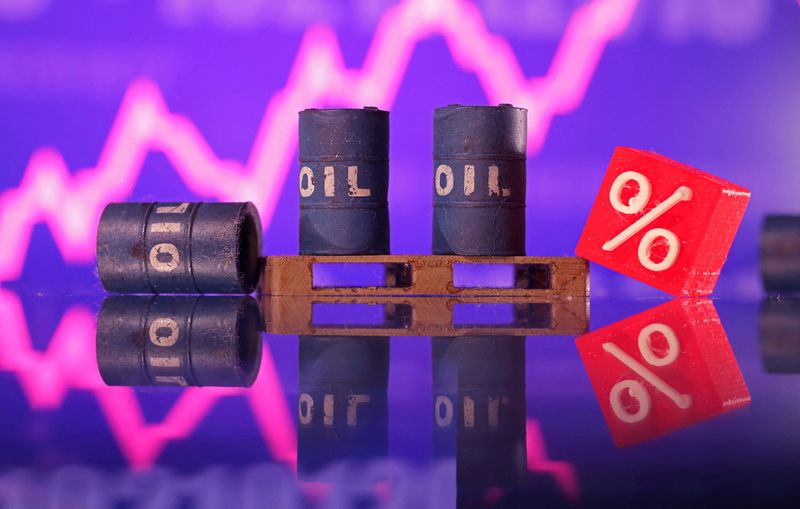By Anna Hirtenstein
LONDON (Reuters) - Oil extended gains for a third session on Monday, with Brent crude rising above $80 a barrel to its highest in more than four months, driven by wider U.S. sanctions on Russian oil and the expected effects on exports to top buyers India and China.
Brent crude futures rose $1.20, or 1.5%, to $80.96 a barrel by 1022 GMT after hitting the highest level since Aug. 27 at $81.49.
U.S. West Texas Intermediate crude was up $1.30, or 1.7%, at $77.87 a barrel after touching its highest since Aug. 15 at $78.58.
Brent and WTI have climbed by about 6% since Jan. 8, surging on Friday after the U.S. Treasury imposed wider sanctions on Russian oil. The new sanctions included producers Gazprom (MCX:GAZP) Neft and Surgutneftegaz, as well as 183 vessels that have shipped Russian oil, targeting revenue Moscow has used to fund its war with Ukraine.
Russian oil exports will be hurt severely by the new sanctions, pushing China and India to source more crude from the Middle East, Africa and the Americas, which will boost prices and shipping costs, traders and analysts said.
"There are genuine fears in the market about supply disruption. The worst case scenario for Russian oil is looking like it could be the realistic scenario," said PVM analyst Tamas Varga. "But it’s unclear what will happen when Donald Trump takes office next Monday."
The sanctions include a wind-down period until March 12, so there may not be major disruptions yet, Varga added.
Goldman Sachs (NYSE:GS) estimated that vessels targeted by the new sanctions transported 1.7 million barrels per day (bpd) of oil in 2024, or 25% of Russia's exports. The bank is increasingly expecting its projection for a Brent range of $70-85 to skew to the upside, its analysts wrote in a note.
Expectations of tighter supplies have also pushed Brent and WTI monthly spreads to their widest backwardation since the third quarter of 2024. Backwardation is a market structure in which prompt prices are higher than those for future months, indicating tight supply.
RBC Capital Markets analysts said the doubling of tankers sanctioned for moving Russian barrels could be a major logistical problem affecting crude flows.
"No one is going to touch those vessels on the sanctions list or take new positions," said Igho Sanomi, founder of oil and gas trader Taleveras Petroleum.
"Russian supply is going to be disrupted, but we don’t see this having a significant impact because OPEC has spare capacity to fill that supply gap."
The OPEC+ cartel comprising the Organization of the Petroleum Exporting Countries and a group of Russia-led producers, is holding back 5.86 million barrels per day, about 5.7% of global demand.
Many of the tankers named in the latest sanctions have been used to ship oil to India and China after previous Western sanctions and a price cap imposed by the Group of Seven countries in 2022 shifted trade in Russian oil from Europe to Asia. Some of the ships have also moved oil from Iran, which is also under sanctions.

"The last round of OFAC (U.S. Office of Foreign Assets Control) sanctions targeting Russian oil companies and a very large number of tankers will be consequential in particular for India," said Harry Tchilinguirian, head of research at Onyx Capital Group.
JPMorgan (NYSE:JPM) analysts said Russia had some room to manoeuvre despite the new sanctions, but it would ultimately need to acquire non-sanctioned tankers or offer crude at or below $60 a barrel to use Western insurance as stipulated by the West's price cap.